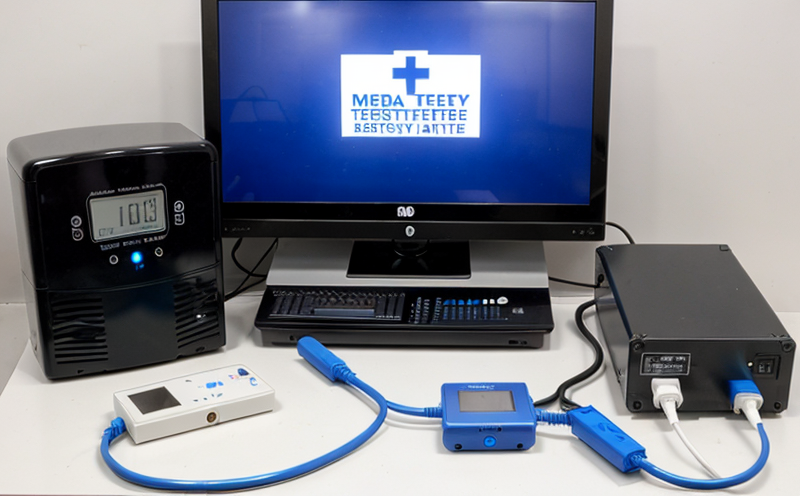ANSI C18.2M Medical Device Portable Secondary Battery Testing
The ANSI C18.2M standard is a critical guideline for ensuring the safety and reliability of portable secondary batteries used in medical devices. This standard covers the testing procedures for these batteries to ensure they meet stringent performance, durability, and safety requirements. The primary goal is to protect patients by minimizing the risk of failure during use, which could lead to hazardous situations.
Portable secondary batteries in medical devices are subject to a range of environmental and operational stresses that can significantly affect their performance over time. These batteries must withstand rigorous testing protocols to ensure they meet the standards set forth by ANSI C18.2M. The standard covers a wide array of tests, including electrical safety checks, mechanical stress tests, thermal endurance assessments, and more.
The testing process for these batteries is highly technical and involves precise instrumentation to measure various parameters such as voltage, current, capacity retention, internal resistance, and temperature stability. These measurements are crucial for determining the battery's ability to maintain its performance under real-world conditions. The ANSI C18.2M standard ensures that all tests conducted are standardized, providing a consistent basis for comparison across different manufacturers.
The testing procedures outlined in ANSI C18.2M are designed to identify potential weaknesses or defects in the batteries before they reach the market. This approach helps manufacturers improve product quality and reliability, ultimately benefiting both healthcare providers and patients. The standard's comprehensive nature ensures that all aspects of battery performance are thoroughly evaluated, from initial charging cycles to long-term usage scenarios.
Compliance with ANSI C18.2M is not only a legal requirement but also an essential step in safeguarding patient safety. By adhering to this standard, manufacturers demonstrate their commitment to quality and reliability, which can enhance the reputation of their products in the medical device industry. The rigorous testing protocols defined by ANSI C18.2M provide confidence that batteries used in critical medical devices will perform reliably under a variety of conditions.
For quality managers and compliance officers, understanding the nuances of ANSI C18.2M is crucial for ensuring that their organization's products meet regulatory requirements and industry standards. R&D engineers should also be aware of this standard to incorporate its testing protocols into their development processes. Proper adherence to ANSI C18.2M can prevent costly recalls and legal issues, while also enhancing the overall safety and performance of medical devices.
In summary, ANSI C18.2M plays a vital role in ensuring the reliability and safety of portable secondary batteries used in medical devices. By adhering to this standard, manufacturers can ensure that their products meet stringent performance criteria, thereby safeguarding patient health and safety. The comprehensive testing protocols outlined in ANSI C18.2M provide a reliable framework for evaluating battery performance under various conditions.
Scope and Methodology
The scope of the ANSI C18.2M standard includes the following key areas:
- Electrical safety checks
- Mechanical stress tests
- Thermal endurance assessments
- Initial charging cycles
- Long-term usage scenarios
The methodology involves a series of rigorous tests designed to evaluate the battery's performance, durability, and safety under various conditions. These tests are conducted using precise instrumentation to measure critical parameters such as voltage, current, capacity retention, internal resistance, and temperature stability.
| Test Type | Description | Key Parameters Measured |
|---|---|---|
| Electrical Safety Check | Evaluates the battery's resistance to electrical hazards. | Voltage, current, internal resistance |
| Mechanical Stress Test | Assesses the battery's ability to withstand mechanical stress. | Physical deformation, endurance cycles |
| Thermal Endurance Assessment | Determines the battery's thermal stability and resistance to overheating. | Temperature stability, heat dissipation |
| Initial Charging Cycles | Tests the battery's performance during its first charging cycles. | Voltage retention, capacity loss |
| Long-Term Usage Scenario | Evaluates the battery's performance over extended periods of use. | Cycle life, endurance under real-world conditions |
The ANSI C18.2M standard ensures that all tests conducted are standardized, providing a consistent basis for comparison across different manufacturers. This consistency is crucial for ensuring the reliability and safety of portable secondary batteries used in medical devices.
Why Choose This Test
- Rigorous testing protocols ensure product quality and reliability.
- Compliance with ANSI C18.2M is a legal requirement for many countries.
- The standard provides confidence that batteries used in critical medical devices will perform reliably under various conditions.
Choosing to undergo ANSI C18.2M testing offers several advantages:
- Enhanced reputation and trust among healthcare providers and patients.
- Reduction of costly recalls and legal issues due to product failures.
- Improved product safety, reducing the risk of hazardous situations during use.
The ANSI C18.2M standard is essential for manufacturers who want to ensure that their portable secondary batteries meet stringent performance criteria. By adhering to this standard, manufacturers can demonstrate their commitment to quality and reliability, thereby enhancing the overall safety and performance of medical devices.
Use Cases and Application Examples
- Battery-powered medical devices such as insulin pumps and defibrillators.
- Portable diagnostic tools used in remote healthcare settings.
- Life-sustaining equipment in emergency situations, like ventilators.
The ANSI C18.2M standard is particularly relevant for the following use cases:
| Battery-Powered Medical Device | Use Case Description |
|---|---|
| Insulin Pump | Automatically delivers insulin to patients with diabetes. |
| Defibrillator | Administers electrical shocks to restore normal heart rhythm in cardiac arrest victims. |
| Portable Diagnostic Tool | Performs diagnostic tests at remote locations, providing immediate results for healthcare professionals. |
In each of these use cases, the reliability and safety of the battery are critical. ANSI C18.2M testing ensures that batteries used in these devices meet stringent performance criteria, thereby safeguarding patient health and safety.





